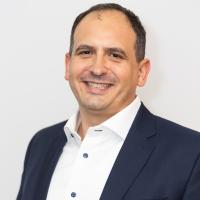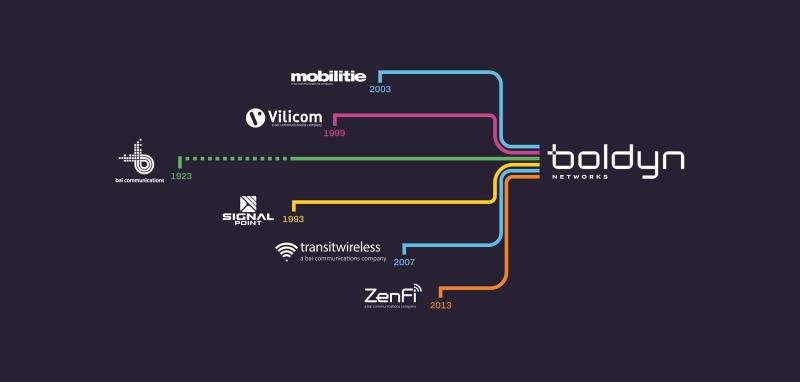Boldyn Networks is bringing six companies into one this summer: BAI Communications, Mobilitie, Transit Wireless, ZenFi Networks, Signal Point Systems and Vilicom.
Former Mobilitie CEO Christos Karmis, who was recently appointed CEO of BAI's U.S. business, will oversee the upcoming Boldyn Networks in the U.S. Fierce caught up with him before the Memorial Day weekend to find out what’s in store for the new organization.

Technically speaking, BAI Group will be splitting from BAI Australia to become Boldyn Networks and establishing its global headquarters in the northern hemisphere. The Australian business will continue to operate under the BAI brand for now.
For the part of the business that’s splitting off, they decided against leveraging one of the existing brands in favor of a new one, according to Karmis. “I think there’s a ton of reasons why that makes sense,” he said, quipping that “thankfully, it’s easier for people to pronounce than Mobilitie was.”
He explained that the name “Boldyn” comes from a combination of the words “bold” and “dynamic,” and these two words capture the culture of the company and its people.
June 28 is the formal launch date of the integration of the U.S. business and the new brand globally. “We sort of think of it as one big initiative here,” he said.
In a statement, Boldyn Chief Marketing Officer Sarah Roberts said they wanted to create a “future forward brand” that would demonstrate the company’s role in shaping the industry.
“We went through a very careful and purposeful process in the creation of the brand to create a vision for our people, customers and the market that is true to us,” she said. “We want to clearly illustrate that we are bold and dynamic thinkers, so it was important that our brand and visual identity was fresh, different, and future forward. It had to be relatable to our people and our industry.”
Building a “powerhouse brand”
The company is privately held and majority owned by the Canadian Pension Plan Investment Board (CPP Investments). Being privately held is helpful in that public companies are often held to results on a quarterly basis, and a lot of Boldyn’s business involves a longer range view, Karmis said.
Boldyn’s business sounds a lot like Boingo Wireless, and he concedes they do some of the same things, like providing connectivity to public transportation hubs, military bases and sports and entertainment venues across the country.
As BAI, the business acquired several companies that were each pretty big names in their own right.

BAI owned Transit for about a decade. They acquired Mobilitie in 2021, and in 2022, Mobilitie acquired and integrated Signal Point, which was focused on military bases. In 2021, BAI also acquired Vilicom, an Irish mobile network company. In 2022, it acquired ZenFi in New York, making four of the five acquired companies based in the U.S.
Now Boldyn’s mission is to combine its properties into what it’s calling a “powerhouse brand” that will become the dominant and “most innovative” neutral host provider nationwide. That includes delivering 5G, Wi-Fi, private LTE and fiber connectivity to public transportation hubs, venues, real estate properties, hospitality sites, military bases, smart cities and so on.
Earlier this year, Mobilitie completed a new distributed antenna system (DAS) deployment at the Crypto.com Arena and L.A. Live area in Los Angeles. According to Stadium Tech Report, the stadium and surrounding entertainment district now has a network capable of supporting 5G New Radio (NR) technologies on a wide range of spectrum, including low-band and mid-band as well as newer C-band and millimeter wave.
CBRS & Open RAN
The company employs about 500 people in the U.S. and 750 globally. Karmis, who is based in Newport Beach, California, will not be relocating, as company executives are distributed throughout the country. The company recently announced the senior leadership team that will report to Karmis.
Incidentally, Karmis and his team are very bullish on Citizens Broadband Radio Service (CBRS) spectrum, both from a Priority Access License (PAL) and unlicensed General Authorized Access (GAA) perspective. That’s a big piece of the private network business.
Of course, it uses other spectrum as well, but CBRS is a “great use” of that spectrum, he said.
As for open Radio Access Network (RAN), that’s also of interest, but that’s pretty much a balancing act with what its carrier partners are doing. It’s an important part of the future, but BAI/Boldyn needs to align technically with what the carriers are doing. They are, after all, the anchor tenants on neutral host systems.
Article updated to include more information about its acquisitions and a statement from Chief Marketing Officer Sarah Roberts.